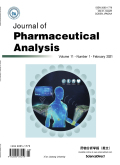首页|期刊导航|药物分析学报(英文)|Modern approaches for detection of volatile organic compounds in metabolic studies focusing on pathogenic bacteria:Current state of the art
药物分析学报(英文)2024,Vol.14Issue(4):483-505,23.DOI:10.1016/j.jpha.2023.11.005
Modern approaches for detection of volatile organic compounds in metabolic studies focusing on pathogenic bacteria:Current state of the art
Modern approaches for detection of volatile organic compounds in metabolic studies focusing on pathogenic bacteria:Current state of the art
摘要
关键词
Volatile organic compounds/Pathogenic bacteria metabolites/Metabolomics/Microextraction techniques/Gas chromatography-mass spectrometry/In vivo breath analysis/In vitro modelKey words
Volatile organic compounds/Pathogenic bacteria metabolites/Metabolomics/Microextraction techniques/Gas chromatography-mass spectrometry/In vivo breath analysis/In vitro model引用本文复制引用
Karolina Żuchowska,Wojciech Filipiak..Modern approaches for detection of volatile organic compounds in metabolic studies focusing on pathogenic bacteria:Current state of the art[J].药物分析学报(英文),2024,14(4):483-505,23.基金项目
This research was funded by the National Science Centre,Poland(Project No.:2017/26/D/NZ6/00136). (Project No.:2017/26/D/NZ6/00136)

